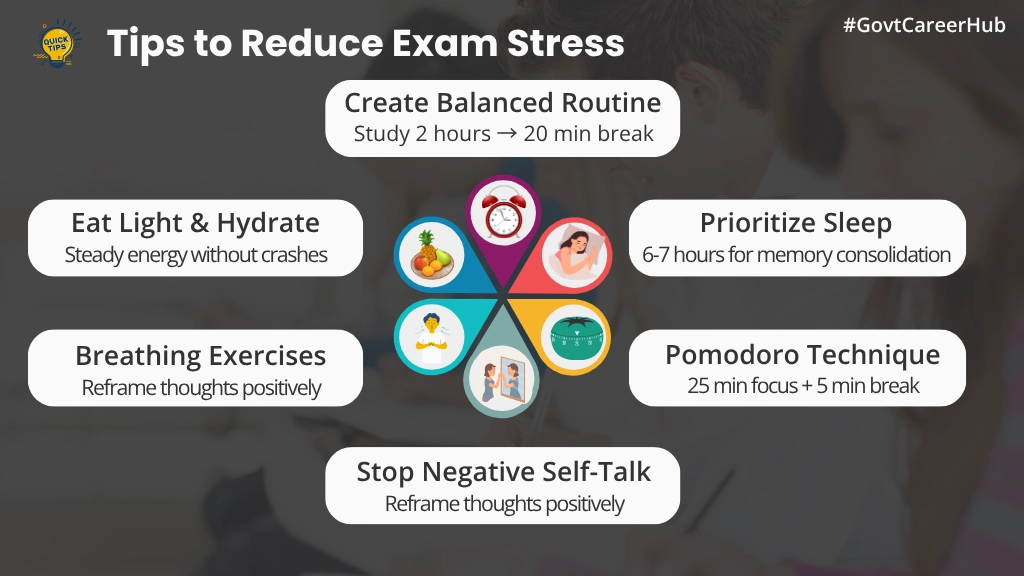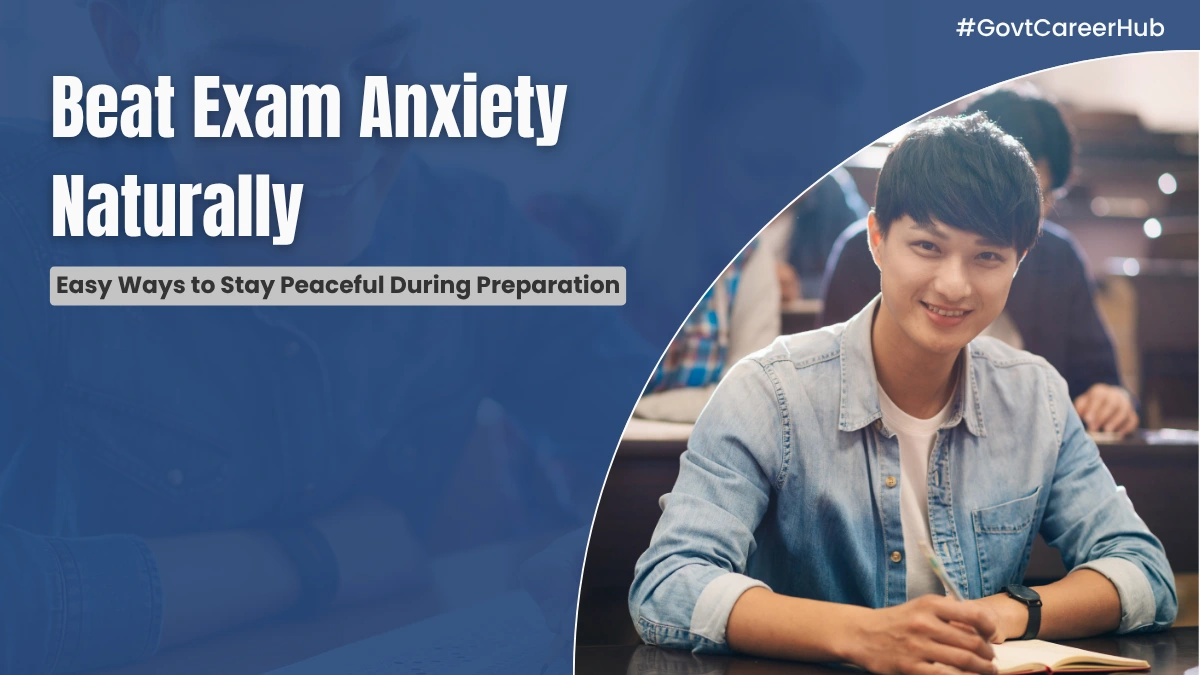Last Updated: July 7, 2025 at 2:32 pm
It’s 11 PM. You’re staring at your textbook, but the words blur together. Your heart races as thoughts flood your mind: “Did I cover everything? What if I blank out? What if I disappoint everyone?”
Sound familiar? You’re not alone. Every year, millions of Indian students experience this exact moment of panic. Whether you’re facing board exams, preparing for JEE/NEET, or tackling government exams like UPSC or SSC, exam stress feels unavoidable.
But here’s what nobody tells you: stress doesn’t have to sabotage your performance. The most successful students aren’t stress-free – they’ve simply learned how to manage it effectively. These tips to reduce stress during exams will help you transform that overwhelming anxiety into focused energy.
Why Indian Students Face Intense Exam Stress
Before diving into solutions, let’s be honest about why exam stress hits so hard in India. It’s not just about the papers – it’s about everything they represent.
The Weight of Expectations: Your exam results aren’t just yours. They become family dinner conversations, neighbor comparisons, and social media posts. When Uncle asks about your marks at every family gathering, the pressure multiplies.
Fear of Limited Opportunities: With lakhs competing for thousands of seats, every mark feels life-changing. The stories of brilliant students struggling to find jobs add to the anxiety of “what if I don’t make it?”
The Comparison Trap: Social media makes it worse. Seeing classmates post study schedules or mock test scores creates constant self-doubt. That inner voice asking “Am I doing enough?” becomes deafening.
All-or-Nothing Thinking: Many students believe studying 16 hours daily equals success. This mindset leads to burnout, making stress worse instead of better.
10 Practical Tips to Reduce Stress During Exams

1. Create a Balanced Daily Routine (With Real Breaks)
Instead of cramming for 12 hours straight, build a routine that includes study time, meals, exercise, and actual rest. Your brain needs downtime to process information effectively.
Example: Study for 2 hours, then take a 20-minute walk or chat with family. This isn’t wasted time – it’s investment in better focus when you return to your books.
2. Avoid All-Nighters and Prioritise Sleep
That extra hour of midnight studying won’t help if you’re too tired to think clearly during the exam. Your brain consolidates memory during sleep, making those 6-7 hours crucial for retaining what you’ve learned.
Reality Check: A well-rested student who studied for 8 hours will often perform better than an exhausted student who studied for 12 hours.
3. Follow the Pomodoro Technique for Focused Study
Study in focused 25-minute chunks with 5-minute breaks. After 4 sessions, take a longer 15-30 minute break. This prevents mental fatigue and keeps you sharp throughout the day.
Why it works: Your brain can only maintain intense focus for limited periods. Working with this natural rhythm, not against it, reduces stress and improves retention.
4. Limit Negative Self-Talk
Notice when your inner voice becomes your worst critic. Instead of “I’m so stupid, I’ll never pass,” try “This is challenging, but I’m learning and improving.” This shift in self-talk can dramatically reduce exam anxiety.
Practical tip: Write down negative thoughts, then rewrite them in a more balanced way. This simple exercise helps break the cycle of stress-inducing thoughts.
5. Use Simple Breathing Exercises (Like 4-7-8)
When panic hits, try the 4-7-8 breathing technique: Inhale for 4 counts, hold for 7, exhale for 8. Repeat 3-4 times. This activates your body’s relaxation response and can calm you down within minutes.
When to use: Before starting study sessions, when you feel overwhelmed, or right before entering the exam hall.
6. Eat Light, Stay Hydrated
Heavy meals make you drowsy, while hunger makes you irritable. Eat light, frequent meals with plenty of water. Avoid excessive tea or coffee, which can increase anxiety.
Smart choices: Fruits, nuts, yogurt, and whole grains provide steady energy without the crash that comes from sugary snacks.
7. Avoid Social Media During Revision Time
That Instagram story about someone’s study setup or WhatsApp group discussing exam fears will only increase your anxiety. Create phone-free study zones and limit social media to specific times.
Alternative: If you need breaks, listen to music, take a walk, or do something offline that relaxes you.
8. Practice Writing Mock Papers Under Timed Settings
Exam stress often comes from fear of the unknown. Regular practice under exam conditions makes the actual test feel familiar and manageable.
Bonus benefit: You’ll discover your weak areas early and have time to improve, rather than panicking during the actual exam.
9. Talk to a Friend or Mentor
Don’t bottle up your worries. Share your concerns with someone who understands – a friend, teacher, or family member. Sometimes just expressing your fears out loud reduces their power over you.
Remember: Others have walked this path before you. Their perspective and encouragement can be incredibly calming.
10. Trust Your Preparation and Avoid Last-Minute Panic
Two days before the exam, avoid learning completely new topics. Focus on revision and trust that you’ve done your best with the time you had. Last-minute cramming often increases stress without significantly improving performance.
Simple Daily Routine for Exam Week
| Time | Activity |
| 6:30 AM | Wake up + 10 minutes stretching |
| 7:00 AM | Quick revision of yesterday’s topics |
| 8:00 AM | Breakfast |
| 9:00 AM – 11:00 AM | Focused study (hardest subject) |
| 11:20 AM – 1:20 PM | Study session 2 |
| 1:30 PM | Lunch + 30 min rest |
| 2:30 PM – 4:30 PM | Study session 3 |
| 4:45 PM – 6:45 PM | Revision + practice questions |
| 7:00 PM | Exercise/walk |
| 8:00 PM | Dinner + family time |
| 9:00 PM – 10:00 PM | Light review |
| 10:30 PM | Sleep |
Critical Mistakes to Avoid
Comparing Yourself to Others: Everyone has different strengths and circumstances. Your classmate’s 15-hour schedule doesn’t mean you need one too.
Skipping Meals: Hunger increases anxiety and reduces concentration. Your brain needs proper fuel to function optimally.
Last-Minute Cramming: Two days before the exam, focus on revision, not new topics. Trust your preparation instead of panicking.
Complete Isolation: While focused study is important, cutting off from family and friends completely can increase stress.
The Truth About Exam Success
Exam stress is real, but it doesn’t have to control your performance. The most successful students aren’t necessarily the ones who study the most – they’re the ones who study smart, stay balanced, and manage their stress effectively.
Remember this: your worth isn’t determined by a single exam result. You’ve worked hard, learned, and grown. These tips to reduce stress during exams aren’t just theoretical advice – they’re practical strategies that thousands of students have used to transform overwhelming anxiety into focused determination.
You’re not alone in this journey. Every successful person has faced moments of doubt and stress. The difference lies in how you respond to these feelings. With the right exam relaxation techniques and a balanced approach, you can perform your best while staying mentally healthy.
Trust in your preparation, stay calm during the process, and remember that taking care of your mental health actually improves your academic performance. You have everything you need within you to succeed.
Quick Answers to Your Biggest Worries
These strategies have helped thousands of students stay calm and focused during their most important exams. If this guide eased your stress even a little, share it with a friend who needs it too. Drop a comment below about which tip resonated most with you, and follow GovtCareerHub for more practical guidance on academic success and career growth. Remember – you’re stronger than you think, and you’ve absolutely got this!
Related Post:







